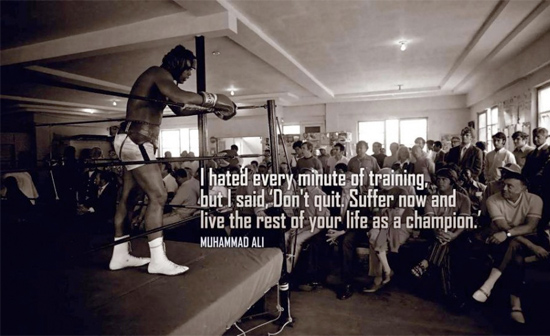In a recent Interview with John Lee Dumas of Entrepreneur on Fire, I ended up having a deep conversation about failure and one’s ability to recover from it. I also broke down how you can take all your past experiences and connect the dots in order to find what you are truly passionate about. During my interview, John mentioned how he, himself, had held multiple jobs in which he was very miserable prior to finding his calling with Entrepreneur on Fire, but he said something that I didn’t quite agree with. Perhaps it was not meant to be taken literally, but I felt it needed to be discussed more.
“It is ok to be a quitter”
Thinking about this line in a literal sense may seem contradictory to everything we teach at the Secret Entourage Academy, and I decided to expand on the context of when quitting is a good idea. While it is my belief that quitting is never an option and giving up doesn’t exist in my dictionary, I do believe that you have to know when you have leveraged yourself enough and the time has come to expose yourself to new experiences. Many people ask me if they should stay at their dead end job after they have only been there 6 months, and find themselves bored. Others ask me if they should give up on their venture when they clearly haven’t made any money after 6 months of hard work.
You should never quit if your definition of quitting is aligned with giving up due to your inability to complete the job or find engagement. Quitting, in itself, in this case, was referred to as your ability to move on when there is no more value present in the role or job at hand. If you have maximized your learning, and leveraged your actions to the point when you have reached your comfort zone then perhaps you might want to reconsider what your objective at that very moment might be, and might even want to consider expanding your reach into other projects, businesses, or professions. While many will consider their bad experiences as failures, I consider them an important aspect of success, as you need to be exposed to new things in order to expand your reach. The more places you work, the more aware you become of the various environments and inner workings of different industries enabling you to utilize that later on and expand your reach even further.
Here is a great and simple example.
When I originally was in banking, I always found myself hating my role as it involved selling a lot more than I wanted to, and involved managing people only 20 – 30% of the time. I never really liked it and never saw value in what I was doing, but I decided to make my time count and exceed at everything I did, regardless of my like or dislike of the role. I felt that if I was going to spend 40 hours at work, I might as well move up and earn more money for that same 40 hours. That said, I worked hard and moved up the ranks quickly only to find myself eventually in a position that involved managing people 80% of the time and teaching others 20% of the time. While I found myself enjoying my new role much more, I simply would have never succeeded in it without the direct experiences I gained in my previous roles as well as my previous job. In my previous role selling, I also learned what I was selling to others held value in my own life and enabled me to understand supply and demand as well as real estate lending, allowing me to make my first million by the age of 27. While there was no immediate correlation between making money and having a successful career, one couldn’t have happened without the other having created the opportunity.
Jordan Swerdloff of ADV1 Wheels can also attest that he would have never been able to build a 7-figure wheel company in 2 years without having significantly failed during his first attempt. The reality is that despite the harsh failure he faced, he never actually quit learning from it, only to come back stronger and more prepared for the second round.
That said, here is the main take away you need to consider. Regardless that you are in a dead end job or a struggling start-up, you need to stop thinking about quitting and instead think about what you are missing on learning, as this so called dead end situation could very well be a piece of the foundation you need to eventually reach your very own goal.
It is never OK to quit, but it is OK to want more and go after it.
